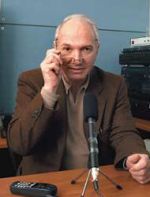Article 19 calls on the Hungarian Media Council to recognise the need for media pluralism and restore confidence in its ability to make autonomous and politically neutral regulatory decisions.
Too much power in hands of Media Council
The London based organisation says that expansive discretionary powers over licensing decisions given to the Council by recent media laws are being abused to censor political discussions and have left  the popular radio station on the verge of closure.
the popular radio station on the verge of closure.
Unprecedented regulatory power on the five members of the Council is conferred by Act LXXXII. The Council has the power to revoke licenses or impose fines of up to 700,000 euros for “unbalanced coverage”.
All members of the Council are affiliated to the same governing party; indeed, the current chairperson is a former MP of ruling right-wing Fidesz party and a long-term confidante of the Prime Minister.
Political debates on air
”Klub Radio” is one of only a handful of political talk radio stations in Hungary, the other of which are mainly pro-government. Over the last 10 years “Klub Radio” has been a consistent proponent of liberal values and, since the right-wing Fidesz Party came to power last year, the station has been relentlessly critical of the government’s policies.
The station’s most famous presenter Gyorgy Bolgar, for example, hosts a daily programme called “Let’s Discuss It” in which generally left-leaning listeners call in and criticise the direction in which the country is heading.
The diversity of its programming – with almost 40 different programmes each week covering various aspects of public life – along with its emphasis on interactive participation have made the station enormously popular: the average number of listeners on weekdays, for example, is between 200,000 and 400,000 people.
Closure: music instead of news
According to Article 19, despite these figures, “Klub Radio ” now faces permanent closure. In February 2011, the “Klub Radio’s” license at 95.3MHz expired, requiring the station to enter into a new competition for the frequency. In June 2011, however, the Media Council quietly introduced a new system of frequency licenses. The new tender for 95.3 MHz frequency is for a ‘music radio that presents some local information and values’.
” now faces permanent closure. In February 2011, the “Klub Radio’s” license at 95.3MHz expired, requiring the station to enter into a new competition for the frequency. In June 2011, however, the Media Council quietly introduced a new system of frequency licenses. The new tender for 95.3 MHz frequency is for a ‘music radio that presents some local information and values’.
The tender grants maximum points to stations with over 60 per cent music and 25 per cent local news content. Since “Klub Radio” consists of about 75 per cent speech on matters of national politics, it is now practically impossible for it to win the competition in its current form.
Conversely, pro-governmental alternatives to “Klub Radio”, such as Lánczhíd Rádió, obtained a new license from the Council without any problems.
Index on Censorship claims that there is nothing intrinsically unfair about attaching conditions to broadcasting licenses, the composition of the new tender seems strikingly counter-intuitive. The majority of Budapest frequencies are currently given over to music stations, with only a handful hosting talk radio stations.
Any consideration of pluralism and diversity clearly therefore demand that licensing conditions be composed in favour of the latter. The Media Council has dismissed these complaints as “ridiculous”, claiming that they betray a lack of understanding as to the economic realities of commercial competition.
It does not make economic sense to reject a station that attracts 300,000 listeners a day in Budapest alone and which inspires passionate loyalty amongst its followers.
A political decision?
Article 19 is concerned at the apparently arbitrary na ture of the Media Council’s decision. According to Index on Censorship, Gyorgy Bolgar, left, along with the radio’s owner Andras Arato, believe that “Klub Radio” is being targeted for political reasons.
ture of the Media Council’s decision. According to Index on Censorship, Gyorgy Bolgar, left, along with the radio’s owner Andras Arato, believe that “Klub Radio” is being targeted for political reasons.
This is not the only regulatory decision made by the Council over the last few months which has prejudiced the interests of “Klub Radio”. In April 2010 “Klub Radio” successfully applied to the ORTT (the Media Council’s predecessor) for another frequency at 92.2MHz. The contract for this frequency, however, was never concluded and eight months later the new Media Council refused to recognise it.
Before introducing the current system, the Council issued provisional licenses to “Klub Radio” on a two-month basis, claiming that the old system needed to be completely overhauled and more time was needed to establish a new procedure.
The uncertainty this created acted as a powerful deterrent to prospective sponsors and it was only via donations from listeners – who contributed €500,000 to the station – that “Klub Radio” was able to carry on broadcasting.
Media laws are censoring
Media regulation is an exceptionally delicate area and the unfettered discretion granted to the Media Council, along with the complete absence of accountability institutionalised by the media laws, therefore has a number of pernicious implications for freedom of expression.
Article 19 calls on the Media Council to apply international standards on pluralism and media freedom, and to take into consideration “Klub Radio’s” unique position when allocating licenses.
Radio’s” unique position when allocating licenses.
According to Article 19, the Media Council must show the international community that it can be trusted with the unprecedented new powers that have been conferred on it by the recent media laws and must demonstrate that its regulatory decisions are being made independently of political inclination.
Hungarian Media Laws Q&A
Article 19 and the Hungarian Civil Liberties Union (TASZ) have issued a report in which they explain how the new media laws have contributed to the deterioration of the media situation in Hungary.
The report provides information on the scope of the new media laws and explains why the current government of the Fidesz-KDNP conservative party alliance undertook the media reform. The public reaction toward the reform both in Hungary and abroad are also outlined.
Article 19 and the Hungarian Civil Liberties Union identify key discrepancies of the new regime of regulation with international media law standards and explain how they have corroded various aspects of media freedom.
You can find the report here.


